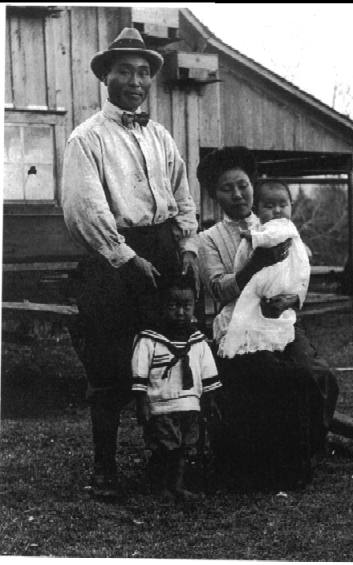Life in Webster

The soil of the farm had grown old, and unsuitable for rice farming. At first, we tried to grow cotton and corn, but neither crop succeeded, and we decided to close the farm and return to Japan. Right after we decided to go back, Onishi gave us a piece of land in Webster to express his gratitude, and asked us to grow rice on that land. We decided to stay in America. I wanted to go home, and canceling our return made me sad.
We moved to Webster, I saw long-waisted dragonflies and lightning bugs, neither of which I had seen since arriving in America. At night, I was surprised to see so many lightening bugs flying around. Also, so many butterflies filled the air in Webster that the sky sometimes looked yellow. After we sprayed the farm, we stopped seeing the butterflies. Sometimes, there were so many mosquitoes outside that the air looked black, and we stayed inside. When we first came to Webster, we had Sundays off, so we went to the coast to catch crabs. Eventually, we started working on Sunday.
Nihonjinkai (an organization for Japanese immigrants in America) was formed and we met once a year in Galveston for a picnic. In Houston, a group of Japanese started a club where we could see Japanese singers, and there I saw the famous Japanese singer, Yoshie Fujiwara. I also saw Japanese movies whenever I could.
Since coming to America, I have read so much. When Onishi returned to Japan, he sent us many books more popular with men than women. In order to distract myself from my loneliness, I read those books at night, by lamplight. Because I read so much Japanese, I never learned English very well.

"I sewed our bonnets using a sewing machine."
Mexican people who worked with us ate a lot of beans cooked with a little oil and lard. They hardly ate meat, but they worked very hard. Caucasians people also liked the beans, and asked us for them occasionally. The Mexicans sometimes had wild parties; a small band would play Mexican dancing music, and kegs of beer were tapped. Sometimes, the parties grew violent, and some people shot one another dead.

Many Japanese tried to immigrate illegally to the United States. If they were found out, the Immigration Officials would come and send them back to Japan. Japanese families in Webster hired some of these illegals. Amongst them were three young men, all in their early twenties. One morning, they started a fight, and one of them was stabbed with a knife. Around four in the morning, a man in a blood-drenched T-shirt rushed into my house, soon followed by the man who had stabbed him. I had no idea what to do; called the doctor to look at the man's wounds. His hand and stomach were both badly wounded, and the doctor treated both injuries. Later, the doctor told us that if the man hadn't covered his stomach with his hand when he was stabbed, the knife wound would've been fatal. Had the police found out about the incident, all three men would have been deported; fortunately, the doctor was a friend of ours, and agreed to say nothing. Fifty years after that night, I received a letter from the man who had been stabbed. Inside was a letter expressing his gratitude and five hundred dollars.
I'm just sitting here by the window, looking at cherry blossoms in the sun. Because of last year's drought, I thought the cherry tree had died, but it didn't. We also have persimmon trees and peach trees here. Both grew from seeds we threw away in the yard. They used to be tall as I am now, but now they're huge, and they bear a lot of fruit. Looking at the persimmon tree reminds me of leaving Japan. I can't forget the delicious taste of those persimmons and figs.
I often see mockingbirds pecking at peaches. Peaches here aren't nearly as good as the ones I ate back home as a little girl. It's common for Caucasians to eat peaches in the morning with sugar and cream. We also have cherries here; some taste good, others don't.
From middle of September to the middle of November, many people suffer from something called hay fever. If you have this problem, your nose runs, and your eyes itch and turn red. I've dealt with hay fever for thirty years.

